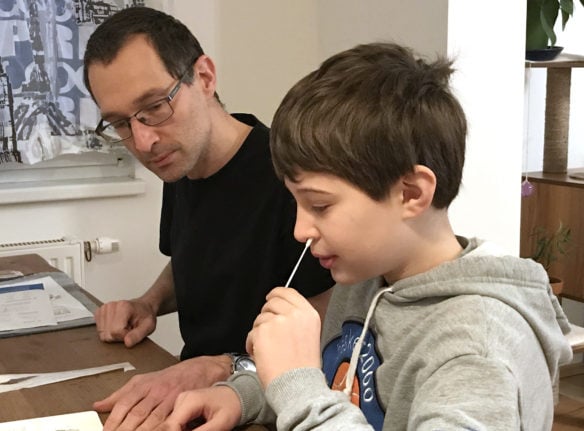That means that anybody can purchase the tests – raising hopes that public life could open faster as more people turn to them as a precaution before attending events or visiting vulnerable groups.
Here’s what you need to know about the roll-out of the rapid tests.
Which tests currently have approval?
Since the beginning of February, manufacturers have applied for special approval for around 30 rapid tests, with the BfArM giving the green light to three of them.
Federal Health Minister Jens Spahn told ARD and ZDF’s Morgenmagazin that the tests would be available in stores in the next few days, meaning they would be “accessible at a low threshold.”
He said he expects there will be further approvals in the next week.
Where can the rapid be obtained?
The home tests will soon be available virtually everywhere – in pharmacies, supermarkets and on the Internet. It remains to be seen how quickly providers will be able to supply them – and how demand and prices will develop.
The federal and state governments plan to discuss on March 3rd how quickly such rapid tests could also be offered for free.
READ ALSO: Germany plans free coronavirus rapid tests for all residents
How easy is it to test yourself at home?
There’s a big plus for the new rapid tests: The sample with the cotton swab can be taken in the anterior nasal region, and thus easily carried out at home. The professional rapid tests, on the other hand, collect the sample material far back in the nose or deep in the throat – meaning that a specialist is needed to assist.
No additional laboratory equipment is needed for the rapid tests. The principle is similar to a pregnancy test: after 15 to 20 minutes, test strips indicate whether the patient is coronavirus positive or negative.
The Frankfurt virologist Sandra Ciesek sees few problems with the at-home tests: “I think everyone gets how to do a nasal smear, and if not, there are enough videos to show them how,” she said in the NDR podcast “Coronavirus Update”.
How could public life reopen with the new Covid-19 test?
Such a rapid test for Sars-CoV-2 would make it easier to visit grandparents spontaneously, for example, as long as they are not vaccinated.
Theatres and cinemas could reopen, and concerts and sporting events could take place, with the negative test serving as the “extra ticket” to enter.
Is a negative result a free pass to do whatever you want then?
No, emphasised the Robert Koch Institute (RKI): “A negative test result does not rule out SarsCoV2 infection!” Even if the test is performed correctly, it is “merely less likely” to be infectious.
In addition, the significance is limited in time – the result can be different the very next day.
The approved tests, however, have to have at least 80 percent accuracy.



 Please whitelist us to continue reading.
Please whitelist us to continue reading.
Member comments